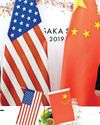With Article 370 gone, Kashmir is at par with any other part of india. There will be resistance, and voices of protest from around the world, but there will be more voices of support from a world that agrees with the idea of a new India

It needed only one stroke of a presidential pen, the boldest stroke ever executed in the Great Game over Kashmir. With that one stroke, India that is Bharat declared to the world that the territory of Kashmir is as sovereign Indian territory as Kamrup, Kathiawar or Kanyakumari. Article 370, by which a corner of its vast territory had been claiming special treatment, simply vanished. No constitution amendment, no long-winded debates, no marshalling of majorities, not even a simple raising of hands.
Not that there was any doubt in the minds of most Indians about India’s sovereignty over Kashmir, but there was always that provision of ambivalence lodged in the Constitution in the form of Article 370. An ambivalence that was legated from an era when such federal ambivalence suited the idea of India that prevailed in the minds of the founding fathers of the republic—the idea of an amorphous, liberal, plural and heterogenous India.
Today, many may carp at that ambivalence, scoff at it as Nehruvian liberal weakness, but the fact is that it had saved Kashmir and India at that time. In fact, there were several such instances of ambivalence—when concessions beyond the call of federal responsibility were extended to peripheral regions—that had helped the young republic recover from post-colonial penury and pangs of partition.
Today, having consolidated into a modern nation-state with rockets, bombs and a billion bellies being fed, the Indian state believes that it does not need such elements of ambivalence in the new idea of India—an assertive, self-willed, determined and homogenous India.
Denne historien er fra August 18, 2019-utgaven av THE WEEK.
Start din 7-dagers gratis prøveperiode på Magzter GOLD for å få tilgang til tusenvis av utvalgte premiumhistorier og 9000+ magasiner og aviser.
Allerede abonnent ? Logg på
Denne historien er fra August 18, 2019-utgaven av THE WEEK.
Start din 7-dagers gratis prøveperiode på Magzter GOLD for å få tilgang til tusenvis av utvalgte premiumhistorier og 9000+ magasiner og aviser.
Allerede abonnent? Logg på

The female act
The 19th edition of the Qadir Ali Baig Theatre Festival was of the women and by the women

A SHOT OF ARCHER
An excerpt from the prologue of An Eye for an Eye

MASTER OF MAKE-BELIEVE
50 years. after his first book, Jeffrey*Archer refuses to put down his'felt-tip Pilot pen

Smart and sassy Passi
Pop culture works according to its own unpredictable, crazy logic. An unlikely, overnight celebrity has become the talk of India. Everyone, especially on social media, is discussing, dissing, hissing and mimicking just one person—Shalini Passi.

Energy transition and AI are reshaping shipping
PORTS AND ALLIED infrastructure development are at the heart of India's ambitions to become a maritime heavyweight.

MADE FOR EACH OTHER
Trump’s preferred transactional approach to foreign policy meshes well with Modi’s bent towards strategic autonomy

DOOM AND GLOOM
Democrats’ message came across as vague, preachy and hopelessly removed from reality. And voters believed Trump’s depiction of illegal immigrants as a source of their economic woes

WOES TO WOWS
The fundamental reason behind Trump’s success was his ability to convert average Americans’ feelings of grievance into votes for him

POWER HOUSE
Trump International Hotel was the only place outside the White House where Trump ever dined during his four years as president

DON 2.0
Trump returns to presidency stronger than before, but just as unpredictable